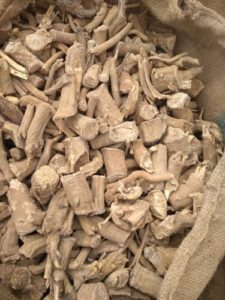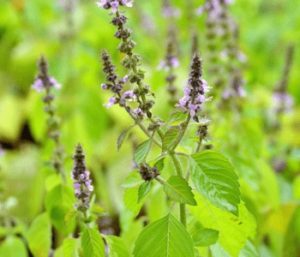Tonic herbs
What are tonic herbs? Tonic herbs are remedies that can be taken on a daily basis to support vitality and longevity, fine-tune an organ system, offer constitutional support. In general, tonic herbs have a high safety profile, with fewer side effects and precautions. Some tonic herbs are also consumed as a food-as you might imagine, these food-medicines can be ingested in higher doses than other herbs.
These are not to be confused with immune stimulating herbs, that have a quick pronounced effect. These class of herbs have a more modulating effect that can be taken over a long period of time and will typically leave your body better than they found them when or should you ever come off of them.

Ashwagandha Root
Different modalities that use tonic medicines are Ayureveda, Traditional Chinese Medicine, and Western Herbology. Ayureveda is a 5,000 year old traditional system of medicine from India. In Ayureveda there’s a tradition of Rasayana tonics and these are taken for overall rejuvenation, nourishment and vitality. Holy Basil (Tulsi), Gotu Kola, Ashwagandha are examples of Rasayana tonics.
In Western Herbal systems, a lot of times we have tonics we take for specific organ systems. For example, Burdock (Arctium lappa) is considered a liver and a kidney tonic. Tonic herbs can also support a particular organ such as the cardiovascular system, nervous system or lymphatic systems. Cleavers (Galium apparine) is a tonic for the lymphatic system helping to move lymph and drain swollen lymph nodes. Another example would be Mullein (Verbascum thapsus) is a tonic supporting the respiratory system.
With this in mind, it also helps to know your constitution to be able to match a remedy specifically to balance out your needs. For example, I run hot. I’m a very zippy and passionate person energetically, therefore I would lean more towards selecting herbs with a cool energetic to bring balance to my body. Examples of this would be Stinging Nettles (Urticia diocia) energetically runs cool, so Nettles is a good fit for me. To learn more about your constitution and the energetic constitutions of herbs here is a great resource I recommend for the basics.
Understanding herbal energetics is more nuanced, and may require you to consult an Ayurvedic or Chinese practitioner. Additionally, many western herbalists are versed in constitutional medicine.
Matching remedies to humans, rather than their disease or disorder, is far more effective for long-term healing, as it addresses underlying imbalances- the energetic leanings that can manifest as specific diseases or symptoms. If we simply treat disease, we fail to tend to these underlying factors, which will often manifest as disease elsewhere in the body.
Alternatively, it is recommended for people that are taking tonic herbs to consider taking a break from tonic herbs every few months. Try switching up remedies periodically. This helps to keep the body from ‘tuning out” the herbs. This is also a great way to practice mindfulness and listening to your body. Same would apply for the foods we eat and paying attention to how our bodies respond when we eat certain foods.
So this spectrum of tonic herbs has different classes within it that leads to this next topic….
Herbal Adaptogens
Adaptogens aid the body in adapting to different types of stress-be it emotional, physical or chemical in nature.
I like to visualize adaptogens as imparting the grace and wisdom of an old willow tree, knowing the strength of yielding to wind, yet remaining deeply rooted in the Earth. All adaptogens are tonic herbs, but not all adaptogens are tonic herbs. They are herbs that can be used safely and tonically and have that tradition of use. Adaptogens increase vitality, have a normalizing influence and are generally without side effects (by not influencing normal body functions when it is not needed). Cool that our bodies naturally have this response to plants huh?
Another important fact about adaptogens. Adaptogens are not unidirectional. Meaning someone has high blood pressure, takes a pharmaceutical that lowers their blood pressure artifically. Whereas adaptogens, the same herb can be used for low blood pressure or high blood pressure, because of its modulating effect when the body registers these compounds in this adaptogenic herb, it takes function of whatever is needed by the body. Pretty miraculous, I know! Adaptogens are balancing, regardless of the imbalance in the body. Adaptogens help to balance our regulatory systems-the nervous and endocrine (hormone) systems.
This early understanding of adaptogens was fleshed out in the 1960’s by Doctor Izrael Brekhman, who elaborated on the theme by setting forth three qualities of adaptogenic herbs:
- Adaptogens are generally safe and have no significant side effects or contraindications.
2. Adaptogens bring about a nonspecific response to improve the resilience of the body to resist multiple stressors, including physical, chemical and psychological.
3. Adaptogens have a normalizing influence on the body, bringing it back to balance, regardless of the direction of change.
This last quality is especially impressive, and is brought about by balancing the neuroendocrine controls of the body. What this means in a human body is that an adaptogen can achieve disparate effects depending on the direction the imbalance has taken. For example, the same herb can raise or lower blood pressure, depending on the state of the person ingesting it. Adaptogens work this “normalizing magic” by affecting the hypothalamic-pituitary-adrenal axis (HPA axis), thus normalizing stress hormone levels. They help the body in protecting itself against the damaging effects of long-term stress and reduce stress reactions during the alarm phase of the stress response.
Adaptogens are becoming increasingly popular remedies in our modern culture, as many people are suffering from chronic stress, overwork, and the harrowing effects of endless multitasking and over-exposure to electronics. These herbs may also be used during an acute phase of stress, such as a big change in life-moving, ending or beginning a relationship, starting a new job, meeting tight deadlines, or living with a fiery two year old after a few years of sleep deprivation.
A holistic stress reduction plan can encompass different therapies and strategies, including exercise, nutrition, talk therapy, yoga, acupuncture, massage, laughter, community support, screen-time reduction, meditation and prayer, or whatever is unique to you that you feel called to do. Home and work life stressors may also need to be addressed, especially if the person doesn’t feel safe or valued. Remember, adaptogens can offer immense ease, but herbs must always be secondary to changing underlying issues that are causing stress and anxiety.

Holy Basil/Tulsi
Primary Adaptogens include:
Ashwagandha (Withania somnifera)
Astragalus (Astragalus propinquus)
Gotu Kola (Centella asiatica)
Cordyceps (Ophiocordycipitacea)
Holy Basil (Ocimum tenuiflorum)
Licorice (Glycyrrhiza glabra)
Reishi (Ganoderma lucidum)
Rhodiola (Rhodiola rosea)
Schisandra (Schisandra chinensis)
Some great options for tonic adaptogens you’ll find in the shop are: “Stress-Away“, “Mental Clarity” or “Rejuvenation & Equantimity” extracts. I take Stress-Away everyday and truly can feel the difference!
No category of herbs holds more potential for overworked, overstressed Americans than adaptogens. They are a bridge that can carry us over stressful situations with our health intact.
-David Winston
Now that we’ve discussed herbal adaptogens, there’s one more class of herbs that fall into the tonic category that’s important to mention….
herbal alteratives
Many herbalists call them “blood cleansers” and indeed many help to optimize the quality of the blood by affecting cellular metabolism. Many alteratives work their magic by supporting the elimination of wastes by improving liver, kidney, digestive and lymphatic function. Here are some descriptions of alteratives from trusted herbalists that may help shed light on this elusive group of remedies. David Hoffmann shares in Medical Herbalism, “Alteratives are herbs that gradually restore proper function to the body and increase overall health and vitality..Alteratives can be used safely as supportive therapy in many diverse conditions and should be considered first for cases of chronic inflammatory and degenerative diseases. These include skin diseases, various types of arthritis, and a wide range of autoimmune problems. And Simon Mills writes in The Essential Book of Herbal Medicine, “This is a large and complex group of remedies widely used throughout history for their generally eliminative, detoxifying or cleansing roles.

Spring Cleansing Tea
Most of these herbs also have secondary supportive qualitites as hepatics, lymphagogues, diuretics, and cholagogues. Here’s a list of common conditions and scenarios calling for tonic alterative support:
1. Autoimmune disorders, such as rheumatoid arththritis, lupus erythematosus, Chron’s disease, and so on.
2. Rheumatic conditions, or chronic skeleto-muscular inflammatory disorders such as osteoarthritis, rheumatoid arthritis, and fibromyalgia.
3. Disorders affecting the skin, including acne, psoriasis and eczema.
4. Poor immunity: Alteratives can be adjunct therapies to herbal immunomodulators to address poor immune function.
5. Cancer prevention and as an adjunct therapy to conventional cancer treatment. Many alteratives are the primary therapies herbalists used to treat tumors and poorly healing sores BEFORE the advent of conventional cancer treatments such as surgery, chemotherapy and radiation. Traditional herbal alteratives that have a background in cancer treatment include violet, cleavers and calendula. These herbs certainly have a supportive role in creating a protocol for cancer survivors to prevent recurrence.
6. Support for fasting and cleansing: Many tonic alteratives have historically been used as spring blood cleansers, or spring tonics after long winters with few fresh vegetables. They are helpful while fasting and cleansing, along with herbal laxatives, hepatics, diuretics and lymphagogues, since alterative herbs help the body to metabolize and excrete enviornmental toxins by supporting the eliminative channels of the body and cellular metabolism.
Tonic Alterative Herbs include:
Burdock (Arctium lappa)
Calendula (Calendula officinalis)
Chickweed (Stellaria media)
Cleavers (Galium aparine)
Dandelion (Taraxacum officinale)
Garlic (Allium sativum)
Gotu Kola (Centella asiatica)
Nettles (Urtica diocia)
Red Clover (Trifolium pratense)
Violet (Viola. tricolor, V. sororia)
Yellow dock (Rumex crispus)
A great tea blend I customized for daily mineral supplementation and blood cleansing support that includes many of these alteratives are these tea blends you’ll find in the shop: “Nutritive & Nourishing Tea” and “Spring Cleansing Tea“
Hope you learned something and found this article to be helpful!
